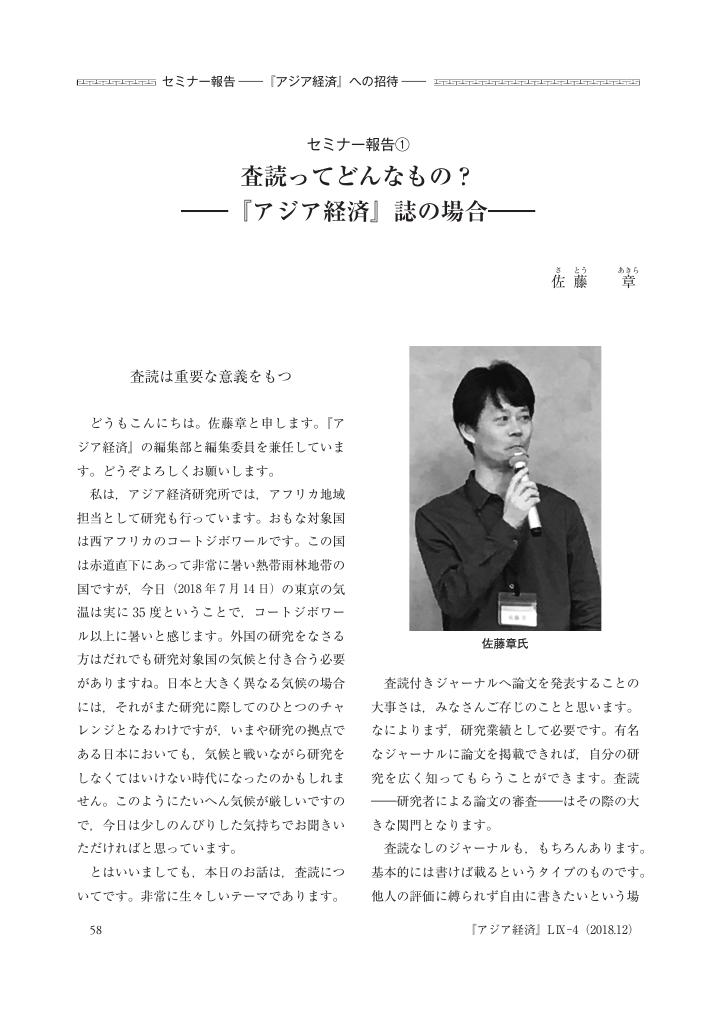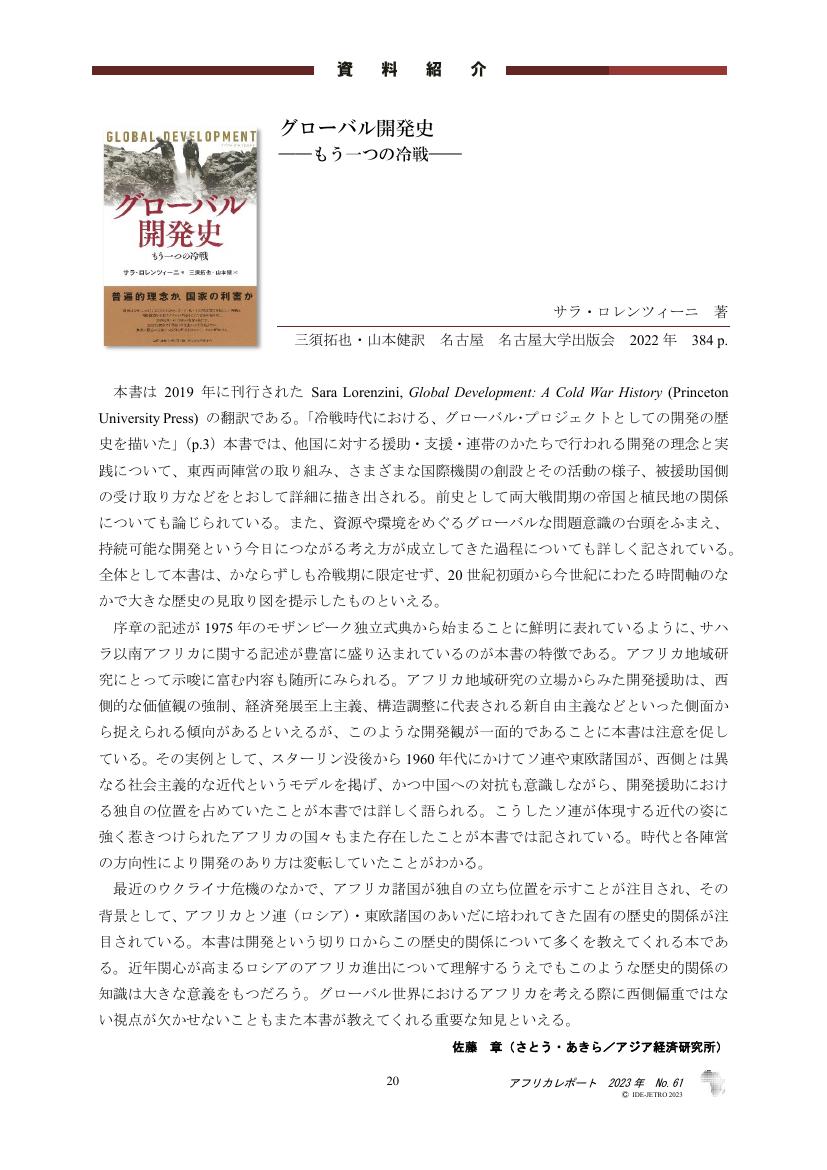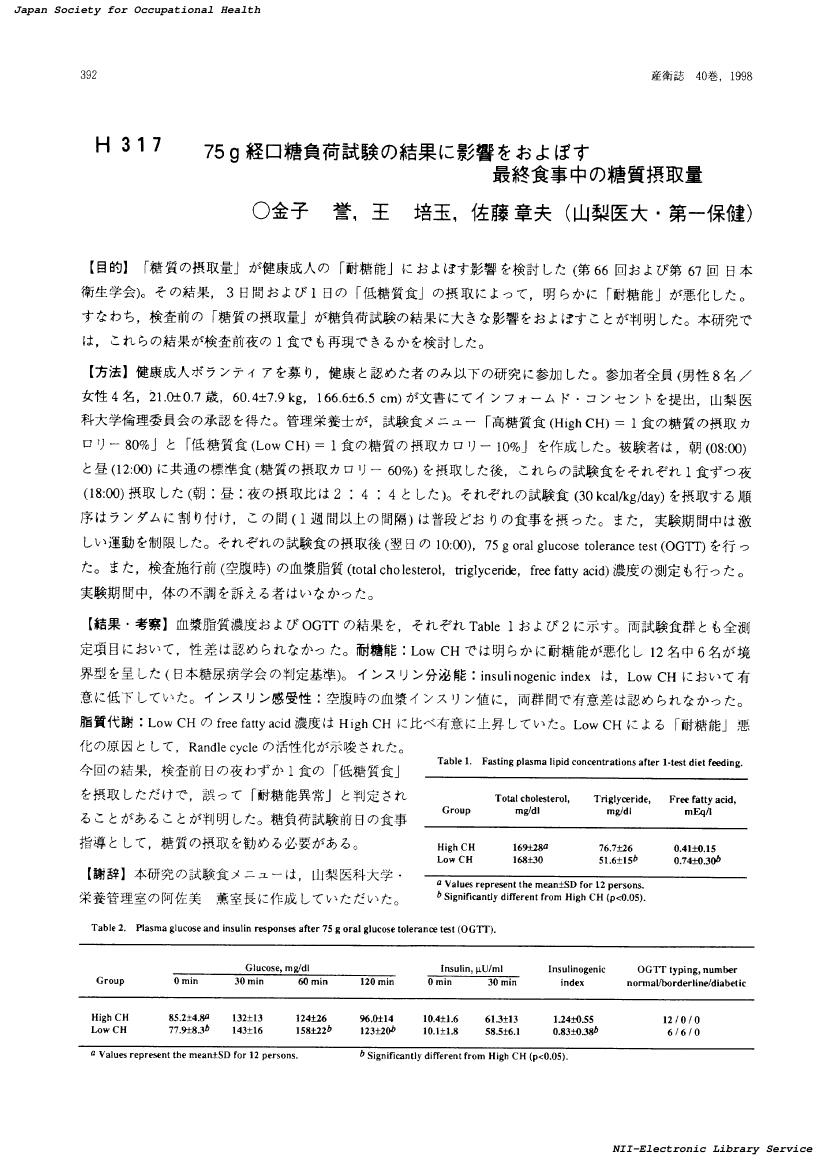- 著者
- 佐藤 章
- 出版者
- 独立行政法人 日本貿易振興機構アジア経済研究所
- 雑誌
- アフリカレポート (ISSN:09115552)
- 巻号頁・発行日
- vol.60, pp.39, 2022-09-01 (Released:2022-09-01)
- 著者
- 松谷 雅生 出口 誠 佐藤 章 田畑 均 喜多村 孝幸 就労支援リハビリテーションプログラム実務委員会
- 出版者
- 一般社団法人 日本脳卒中学会
- 雑誌
- 脳卒中 (ISSN:09120726)
- 巻号頁・発行日
- pp.11031, (Released:2022-07-11)
- 参考文献数
- 26
- 被引用文献数
- 1
【背景および目的】急性期病院退院時に“復職意志”を表明した脳卒中患者に,回復期リハビリテーション(リハ)病院の特徴である十分なリハ期間と豊富なリハプログラムを生かした就労支援リハプログラムを行い,その効果を検証した.【方法】職場復帰に必要な4条件,①家庭生活自立機能,②通勤に必要な運動歩行機能,③一般事務作業機能,④発病前の業務を以前と変わらず遂行する脳の機能,をリハにより強化しつつ,勤務先との連携を取り復職を支援した.【結果】対象81例中,評価対象者61例の復職率は,全症例で85.2%,当院入院時mRS別では,mRS2:92.3%,mRS3:77.8%,mRS4:80.8%であった.【結論】脳卒中発症時点のmRS3–4患者の復職率は50%以下の報告が多い中で,本報告復職率は高い.治療後mRS 3–4患者でも,復職意欲があれば復職が可能であり,今後の脳卒中治療体系の中での回復期リハの重要性を示した.
7 0 0 0 OA セミナー報告① 査読ってどんなもの? ――『アジア経済』誌の場合――
- 著者
- 佐藤 章
- 出版者
- 独立行政法人 日本貿易振興機構アジア経済研究所
- 雑誌
- アジア経済 (ISSN:00022942)
- 巻号頁・発行日
- vol.59, no.4, pp.58-72, 2018-12-15 (Released:2019-03-25)
4 0 0 0 OA 関東地方利根川水系における慢性日本住血吸虫症とそのスクリーニング法
- 著者
- 田中 真奈実 入江 勇治 安羅岡 一男 佐藤 章仁 松本 繁 白田 保夫 中村 尚志 河合 美枝子 海老原 誠
- 出版者
- 一般社団法人 日本感染症学会
- 雑誌
- 感染症学雑誌 (ISSN:03875911)
- 巻号頁・発行日
- vol.62, no.2, pp.156-163, 1988-02-20 (Released:2011-09-07)
- 参考文献数
- 16
関東地方利根川流域で感染した慢性日本住血吸虫症について, 茨城県内診断例12例を中心に, その診断法・病態・治療適応について検討した. 患者は, すべて海外渡航歴・利根川以外の本症流行地への旅行歴はなく, 取手市戸頭, 稲敷郡河内村, 筑波郡谷和原村等かつて本症の流行が報じられた地域の在住者である. 血中抗住血吸虫抗体及び糞便中の虫卵は検査したすべての症例で陰性であった. 8例の患者の確定診断は, 本症とは異なる基礎疾患で摘出された臓器 (胃・十二指腸等上部消化管及び肝・胆道系) 中の日本住血吸虫虫卵の病理学的検索によってなされた. しかし, 茨城県取手市戸頭の3症例と筑波郡伊奈町の1症例は, 人間ドックで画像診断学的に診断されており, 流行地における本症患者のスクリーニングには, 肝エコーにおける魚鱗状パターン, 肝CT像における被膜石灰化像・隔壁様石灰化像等特徴的所見も有用であることが示された. また, その病態は, 基礎疾患によって異なっており, 胃癌・肝癌等悪性腫瘍との合併例は4例であった. プラジカンテルによる治療適応の判定には, 虫卵排出の有無及び虫卵の孵化能の検索が必要であるが, 疑わしい症例には生検材料による孵化試験をすることが必要である. 病理組織学的検索だけでは, 感染時期及び孵化能の判定は困難である.
- 著者
- 佐藤 章
- 出版者
- 独立行政法人 日本貿易振興機構アジア経済研究所
- 雑誌
- アフリカレポート (ISSN:09115552)
- 巻号頁・発行日
- vol.61, pp.20, 2023-03-16 (Released:2023-03-16)
3 0 0 0 IR ベトナム語母語話者における漢語由来語彙と固有語彙の区別
- 著者
- 佐藤 章太
- 出版者
- 東京大学大学院人文社会系研究科・文学部言語学研究室
- 雑誌
- 東京大学言語学論集 (ISSN:13458663)
- 巻号頁・発行日
- vol.36, pp.255-270, 2015-09-30
研究ノート Source Materials and Remarksベトナムは歴史的には漢字文化圏に属し、豊富な漢語由来語彙を持つが、現在は漢字表記を行わず、表音文字のアルファベットで表記している。筆者は、ベトナム語母語話者が、漢語由来語彙である漢越語と固有語である純ベトナム語をどのように区別するのかについて調査した。その結果、使用頻度の高い純ベトナム語が含まれている複合語や、ベトナム語の統語構造でも理解できる漢越語、ベトナム語の統語構造に合わせて語順が入れ替わった漢越語については、純ベトナム語と判断する傾向が見られた。また、日本語や中国語学習を通して漢字を十分に習得している話者については、日本語や中国語で対応する漢字語の知識を用いて判断している可能性も指摘した。As Vietnamese belongs to the Hanzi cultural sphere historically, it has a great number of Sino-Vietnamese words, but as of present, Vietnamese writing system is based on alphabets. The author investigated the ability of Vietnamese speakers to distinguish between Sino-Vietnamese and Vietnamese native words. The results are as follows: the compound words which include a Vietnamese native word of high frequency, the Sino-Vietnamese words compatible with Vietnamese syntactic construction, and the Sino-Vietnamese words whose constituent order is changed to Vietnamese syntactic construction are liable to be considered as Vietnamese native words. Furthermore, the Vietnamese speakers who have obtained enough knowledge of Hanzi (Chinese characters) through the study of Japanese or Chinese are likely to identify the origin of Vietnamese words more correctly than those without such knowledge.
3 0 0 0 OA 岩田拓夫著『アフリカの地方分権化と政治変容』晃洋書房,2010年,170頁,¥2,500
- 著者
- 佐藤 章
- 出版者
- 日本アフリカ学会
- 雑誌
- アフリカ研究 (ISSN:00654140)
- 巻号頁・発行日
- vol.2010, no.77, pp.63-65, 2010-12-31 (Released:2013-12-06)
- 著者
- 佐藤 章
- 出版者
- 独立行政法人 日本貿易振興機構アジア経済研究所
- 雑誌
- アフリカレポート (ISSN:09115552)
- 巻号頁・発行日
- vol.55, pp.1-13, 2017-01-25 (Released:2020-03-12)
- 参考文献数
- 25
この十数年あまり西アフリカでは、イスラーム・マグレブのアル=カーイダ(Al-Qaida in the Islamic Maghreb: AQIM)をはじめとするイスラーム主義武装勢力の活発な活動が見られる。これらの組織の活動は、サハラ・サヘル地帯における治安・安全保障上の問題を提起するにとどまらない。そこでは、イスラーム主義武装勢力が、現代西アフリカの政治的・社会的変動に照らしていかなる意味を持つのかという問題も提起されているのである。そこで本稿は、こういった歴史的評価に関わる問題を掘り下げるための基礎的作業として、AQIMとその系列組織に焦点を合わせ、西アフリカへの進出の経緯、マリ北部への定着の様子、マリ北部紛争への関与、その後の動向を検討したい。その際、「グローバルなテロ組織」といった観点からの研究が陥りがちな視点の偏りを避けるため、これらのイスラーム主義武装勢力が社会とどのような関係を取り結んでいたかにとくに注目し、検討を行う。
- 著者
- 佐藤 章
- 出版者
- 独立行政法人 日本貿易振興機構アジア経済研究所
- 雑誌
- アフリカレポート (ISSN:09115552)
- 巻号頁・発行日
- vol.57, pp.59, 2019-08-29 (Released:2019-08-29)
- 著者
- 田中 真奈実 入江 勇治 安羅岡 一男 佐藤 章仁 松本 繁 白田 保夫 中村 尚志 河合 美枝子 海老原 誠
- 出版者
- 一般社団法人 日本感染症学会
- 雑誌
- 感染症学雑誌 (ISSN:03875911)
- 巻号頁・発行日
- vol.62, no.2, pp.156-163, 1988
関東地方利根川流域で感染した慢性日本住血吸虫症について, 茨城県内診断例12例を中心に, その診断法・病態・治療適応について検討した. 患者は, すべて海外渡航歴・利根川以外の本症流行地への旅行歴はなく, 取手市戸頭, 稲敷郡河内村, 筑波郡谷和原村等かつて本症の流行が報じられた地域の在住者である. 血中抗住血吸虫抗体及び糞便中の虫卵は検査したすべての症例で陰性であった. 8例の患者の確定診断は, 本症とは異なる基礎疾患で摘出された臓器 (胃・十二指腸等上部消化管及び肝・胆道系) 中の日本住血吸虫虫卵の病理学的検索によってなされた. しかし, 茨城県取手市戸頭の3症例と筑波郡伊奈町の1症例は, 人間ドックで画像診断学的に診断されており, 流行地における本症患者のスクリーニングには, 肝エコーにおける魚鱗状パターン, 肝CT像における被膜石灰化像・隔壁様石灰化像等特徴的所見も有用であることが示された. また, その病態は, 基礎疾患によって異なっており, 胃癌・肝癌等悪性腫瘍との合併例は4例であった. プラジカンテルによる治療適応の判定には, 虫卵排出の有無及び虫卵の孵化能の検索が必要であるが, 疑わしい症例には生検材料による孵化試験をすることが必要である. 病理組織学的検索だけでは, 感染時期及び孵化能の判定は困難である.
3 0 0 0 OA ベトナム語母語話者における漢語由来語彙と固有語彙の区別
- 著者
- 佐藤 章太
- 出版者
- 東京大学大学院人文社会系研究科・文学部言語学研究室
- 雑誌
- 東京大学言語学論集 (ISSN:13458663)
- 巻号頁・発行日
- vol.36, no.., pp.255-270, 2015-09-30
研究ノート Source Materials and Remarks
2 0 0 0 内蒙古の遊牧民における糖尿病と高脂血症―食生活との関連において
まず、平成11年に遊牧民地区を調査した。モンゴル遊牧民の血圧水準は非常に高く、収縮期血圧が男性で141±23、女性で136±27と高く、さらに年齢階級別に示すと加齢に伴う収縮期血圧の上昇が日本に比べ男女とも大きいことが判明した。拡張期血圧も同様の傾向を示した。これらの遊牧民の血圧値は、脳卒中の多かった1965-1970年前後の秋田県住民の水準とほぼ同様の値を示すという結果となった。また、高血圧者の頻度も、現在の日本と性・年齢階級別に比較しても約2-10倍程度高いことが判明した。血圧を上昇させる要因の一つとして、塩分摂取量が多いことがあげられる。尿中ナトリウム排泄量から推定される遊牧民の塩分摂取量は男性で約17g/日、女性は約15g/日と非常に高いものであり、かつての秋田と同等の水準であることがわかる。また、遊牧民における糖尿病の調査結果は、304名中に、5名が糖尿病型、7名が境界型。年齢調節した遊牧民糖尿病の割合(2.1%)は、同じ自治区の都会住民のそれ(3.8%)に比べて低かった。次は、平成12年の同じ自治区のモンゴル族農民の調査を行った。モンゴル族農民の血圧水準は収縮期血圧が男性で125±15、女性で126±20;拡張期血圧が男性で80±10、女性で81±13、男女とも遊牧民の血圧水準より有意に低かった。農民の塩分摂取量は男女とも13g/日で、遊牧民のそれに比べて低い水準であった。また、農民における糖尿病の調査結果は、340名中に、8名が糖尿病型、18名が境界型であった。年齢調節した農民の糖尿病の割合(2.2%)は遊牧民と比ぺて差がなく、境界型の割合(4.7%)は遊牧民のそれ(2.1%)より高かった。平成13年に、栄養調査のデータを解析した。三大栄養素の摂取割合は、遊牧民には、脂肪が約35%、タンパク質が14%、糖質が51%;農民はそれぞれに10%、10%、80%であった。その結果が出る次第に、さらに遊牧民および農民の食生活と高血圧と糖尿病の関連について分析する。つまり、遊牧民の食事は高脂肪/低糖質なものに対し、農民には、低脂肪/高糖質の食事を取っている。本調査の結果から、モンゴル族遊牧民と農民の生活習慣病の現状は、糖尿病の有病率が遊牧民と農民のいずれも2%という低い水準であったが、高血圧に関しては、遊牧民の有病率が著しく高かった(やく50%)。その原因は食塩の多量摂取にあると考えられる。
- 著者
- 佐藤 章 Sato Akira
- 出版者
- 日本貿易振興機構アジア経済研究所
- 雑誌
- アジア経済 (ISSN:00022942)
- 巻号頁・発行日
- vol.46, no.11, pp.98-125, 2005-11
1 0 0 0 OA 75g経口糖負荷試験の結果に影響をおよぼす最終食事中の糖質摂取量
- 著者
- 金子 誉 王 培玉 佐藤 章夫
- 出版者
- 公益社団法人 日本産業衛生学会
- 雑誌
- 産業衛生学雑誌 (ISSN:13410725)
- 巻号頁・発行日
- vol.40, no.Special, pp.392, 1998-03-20 (Released:2017-08-04)
1 0 0 0 OA 炭化水素ガスによるレーザ加炭焼入れ技術の開発
- 著者
- 小野 守章 海津 享 真保 幸雄 樺澤 真事 佐藤 章仁 戸塚 和弘 中村 真一郎 玉田 健二
- 出版者
- 一般社団法人 溶接学会
- 雑誌
- 溶接学会論文集 (ISSN:02884771)
- 巻号頁・発行日
- vol.14, no.4, pp.660-665, 1996-11-05 (Released:2009-12-10)
- 参考文献数
- 9
- 被引用文献数
- 1
New laser carburizing quench process using hydrocarbon gas as the assist gas was proposed to strengthen ultra low carbon steel sheet.In this paper, the effect of CH4 concentration and various laser radiation parameters on hardness and area of fusion zone was investigated. Tensile strength of laser treated specimen were measured. The results of the present work were summarized as follows, (1) By using CH4, fusion zone with vickers hardness of more than 400 was obtained.(2) Hardness and area of fusion zone were well controlled by CH4 concentration, laser power, focal position, beam scanning rate and so on.(3) Tensile strength of laser treated specimen was about 20% higher than that of base metal.(4) CO2 laser carburizing apparatus consisting of the nozzle head and the exhaust of CH4 was newly developed, which enabled to strengthen ultra low carbon steel without breaking focal lens and the combustion of CH4.
1 0 0 0 OA ICSIの際の卵細胞膜穿破様式と卵の質および受精,初期発生との関連
- 著者
- 柳田 薫 片寄 治男 鈴木 和夫 近内 勝之 菅沼 亮太 佐藤 章
- 出版者
- JAPANESE SOCIETY OF OVA RESEARCH
- 雑誌
- Journal of Mammalian Ova Research (ISSN:13417738)
- 巻号頁・発行日
- vol.18, no.3, pp.93-98, 2001 (Released:2002-05-31)
- 参考文献数
- 16
- 被引用文献数
- 6
卵細胞質内精子注入法(ICSI)の際の卵細胞膜穿破様式と卵の生存率,受精,分割率,ICSI前の卵の形態学的評価との関連性を検討した.ニードル先端の鋭利性による影響を除外するために,先端が平坦なニードルを使用できるピエゾマイクロマニピュレーターを用いてICSIを行った.ニードルによって卵細胞膜が穿破される様式を細胞膜の伸展性から4タイプに分類した.ICSIを行う成熟卵の約8%は卵細胞膜の伸展性が不良(type A)で,それらの50%はcytolysisを起こした.しかし,生存卵に対しての受精率,受精卵に対しての分割胚率に有意差がなかった.卵内に空胞が認められる不良卵と穿破様式との間にも関連性が認められなかった.
- 著者
- 佐藤 章
- 出版者
- 一般財団法人 日本国際政治学会
- 雑誌
- 国際政治 (ISSN:04542215)
- 巻号頁・発行日
- vol.2018, no.194, pp.194_79-194_94, 2018-12-25 (Released:2019-05-16)
- 参考文献数
- 45
In the 1990s, Sub-Saharan Africa encountered many armed conflicts and, consequently, experienced several regime changes resulting from military victories or the elections following the ratification of peace accords. In this series of events, major international actors, such as the United Nations and developed countries, intervened in Africa under the guise of peace building and promoting democracy to further their own interests in pursuing a new world order during the post-Cold War era. In such a situation, many African countries had to simultaneously accomplish numerous difficult tasks related to aspects such as security, recovery, reconciliation, and democracy. As a result, whereas some countries were successful in these tasks, others failed and had to encounter escalating political instability.Approximately 20 years have passed since then; today, one of the most important changes that one can find in Africa is the significant enhancement of the region’s political and military capacity to respond to conflicts. This paper focuses on this capacity notably exercised by several regional organizations in Africa and discusses two observations regarding this development. First, this enhancement is an outcome of fulfilling the transition toward realizing “African Solutions to Africa’s Problems,” an idea that has received international acclaim since the 1990s. Second, the cooperative task sharing that is implemented between African countries and actors outside Africa, such as the United Nations, has enhanced the region’s capacity to respond to conflicts.Further, this paper examines the unintended outcomes of this enhancement in Africa’s capacity to respond to conflicts. In recent years, several African countries have engaged in active military operations against armed Islamist groups, whose activities, on their part, have escalated the violence occurring in the region. It is true that such operations are the result of autonomous efforts by African countries to satisfy their own security interests. However, in the current global context, their activities imply that they are participating in the “war on terror” led by developed countries. In addition, the recent initiatives for conflict resolution in Côte d’Ivoire and the Gambia by a regional organization in West Africa reveal that some African countries are so confident of their military capacity that they have a radical conviction that military intervention by these countries in other African counties is justified if the purpose is to secure or stabilize democracy in the latter. These unintended outcomes of capacity enhancement can be clearly described as both an ambiguity and a paradox of finding “African Solutions to Africa’s Problems.” By highlighting this aspect, this paper portrays the relationship between the new world order, regime changes, and violence in twenty-first-century Africa.
- 著者
- 佐藤 章
- 出版者
- 独立行政法人 日本貿易振興機構アジア経済研究所
- 雑誌
- アフリカレポート (ISSN:09115552)
- 巻号頁・発行日
- vol.58, pp.88, 2020-09-12 (Released:2020-09-12)
1 0 0 0 OA 急性期病院における小脳出血の機能予後と転帰
- 著者
- 前島 伸一郎 大沢 愛子 山根 文孝 栗田 浩樹 石原 正一郎 佐藤 章 棚橋 紀夫
- 出版者
- 一般社団法人 日本脳卒中学会
- 雑誌
- 脳卒中 (ISSN:09120726)
- 巻号頁・発行日
- vol.33, no.1, pp.98-105, 2011-01-25 (Released:2011-01-26)
- 参考文献数
- 25
- 被引用文献数
- 2
【目的】小脳出血急性期の臨床像と機能予後や転帰に及ぼす要因について検討した.【対象と方法】小脳出血45名(男性28,女性17)を対象に,初回評価時の神経症状に加え,嘔気・眩暈などの自覚症状,認知機能,嚥下機能,血腫量と退院時の日常生活活動,転帰先について検討した.なお,入院期間は平均24.6日であった.【結果】意識障害は11名に認めたが,いずれも血腫量が大きく,機能予後が不良で,自宅退院に至ったものはなかった.意識障害のない34名中,嘔気・眩暈を22名,四肢失調を19名,体幹失調を16名,嚥下障害を19名,構音障害を8名,認知機能障害を24名に認めた.自宅退院は12名で,日常生活活動が良好であると同時に認知機能と嚥下機能が保たれていた.【結語】急性期病院において,小脳出血の退院先を決定する要因には,意識障害や日常生活活動だけでなく,認知機能や嚥下機能も念頭におく必要がある.





